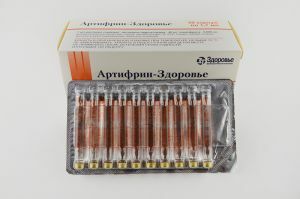 Artifreen is available in the form of a solution for injection and is used in dental practice for local anesthesia. The drug is a combination of locally anesthetic articaine and vasoconstrictor epinephrine.
Artifreen is available in the form of a solution for injection and is used in dental practice for local anesthesia. The drug is a combination of locally anesthetic articaine and vasoconstrictor epinephrine.
The second element is added for a longer duration of the effect of anesthesia. The main component of the drug articaine provides a local anesthetic by reducing the speed of carrying out nerve impulses at the site of exposure.
Contents
Contents
Contents
- Indications
- Indications for use
- Contraindications and restrictions for use
- Application during pregnancy and lactation
- Dosage and dosage
- Specific guidance for use
- Adverse reactions
- According to patients
- Cost and analogues
Basic properties
Artifreenquickly enough( from 1 to 3 minutes) creates a strong anesthetic effect, and is also comfortably tolerated by the tissues of the oral cavity. The maximum time of active action of the drug on the pulp of the tooth is 75 minutes, and on soft tissues - from 120 to 240 minutes.
The composition of the drug includes such active components as articaine hydrochloride and epinephrine, as well as auxiliary elements:
- sodium metabisulphite;
- glycine;
- sodium chloride;
- acidic hydrochloric solution;
- water for injection.
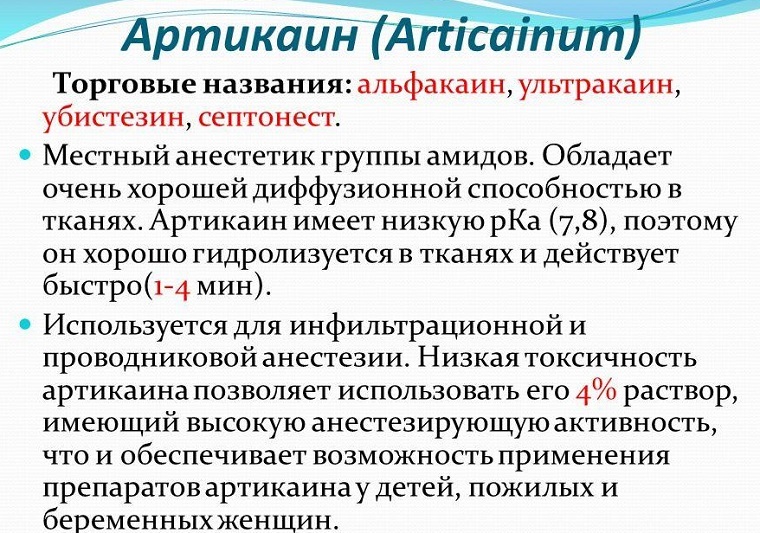
Has the following appearance: clear solution, colorless or yellow-green hue.
The medication should be administered by a submucosal method. After entering the tissue, 2 ml of the solution reaches a maximum strength of action after 10 minutes.
During this period, the concentration of active substances in submucosal tissues is thousands of times higher than the amount of articaine in the circulatory system. The drug is withdrawn 25 minutes after the injection of the syringe, mainly through the kidneys in the articaine acid, arginic acid glucuronide and pure articaine.
Indications for use
The drug is used for anesthesia of mucous membranes, or bone, also during operations on the tooth pulp, with prolonged operating dental procedures, percutaneous osteosynthesis.
This medication can also be used for cystectomy, preparation of carious cavities or teeth for a crown, as well as mukogingival operations. Suitable for manipulating patients suffering from hypersensitivity teeth.
Contraindications and restrictions for the use of
It should be remembered in what situations the medicine can not be used:
- if hypersensitivity to substances that are part of the drug and with intolerance to any local anesthesia( in
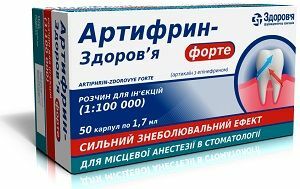 in the latter case, it is necessary to conduct a study on the absence or presence of a reaction to the acting components);
in the latter case, it is necessary to conduct a study on the absence or presence of a reaction to the acting components); - during an exacerbation of heart failure, disorders in the functioning of the sinus node, with acute form of arterial hypertension and hypotension, tachycardia, tachyartimia;
- it is forbidden to apply the drug at a closed angle glaucoma;
- if the patient is diagnosed with hyperthyroidism, or a fechromocytone;
- during the recovery period after myocardial infarction( 3-6 months) and aortocoronary shunting( 3 months);
- during the intake of Propranolol;
- is contraindicated in administering the solution to children under 4 years of age.
Use Artifreen with caution when:
- angina;
- atherosclerosis;
- postinfarction cardiosclerosis;
- disorders of the blood circulation of the brain;
- bronchitis;
- diabetes mellitus;
- emphysema;
- of cholinesterase insufficiency( because the hyperactive elements of the drug are possible);
- for blood clotting disorders;
- serious kidney and liver diseases;
- nervous excitation and during the intake of antidepressants.
Usage during pregnancy and lactation
Studies in rats and rabbits have shown that articaine is able to penetrate the placenta, but in negligible quantities. This feature is preserved only when the required dose is met.
If the dose is exceeded, the concentration of the substance sharply increases, which can adversely affect the fetus. If Artifrin solution is used during breastfeeding, then a single injection of breastfeeding cancellation is not required.
Method of administration and dosage
The drug should be administered only in non-inflamed tissues. During the preparation for the injection, the verbal contact of the doctor and patient 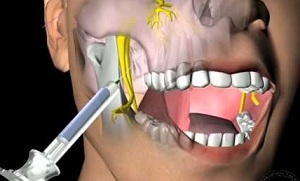 is important for immediate response in the event of a patient feeling ill.
is important for immediate response in the event of a patient feeling ill.
It is desirable to perform a sensitivity test in advance: for this, 0.02 ml of solution is intradermally injected and the reaction is observed for 15 minutes. Even after the appearance of a slight itch, the drug can not be used.
For a simple operation on a single tooth, approximately 1.7 ml of medication per each incisor will be required.
If stitches are required in the sky, the required dose is 0.1 ml per injection.
For the surgical operation, it is necessary to calculate the dose individually in the calculation of 7 mg of artifin for 1 kg of weight. Practical cases of normal tolerability of patients to 500 mg of Artifrin are known to medical practice, which corresponds to 12.5 ml of the active substance.
For elderly patients or those with kidney disease, small doses of the drug should be used.
Specific guidance for the use of
It is forbidden to enter intravenously and into inflamed tissues. Before the injection it is necessary to make a test for sensitivity to the components of the drug.
Do not use open or damaged solution cartridge, or use non-sterile syringes.
If the patient has a disease listed in the contraindications, it is advisable to replace the drug with another that does not contain epinephrine.
You can consume food only after all signs of anesthesia have been completed.
ADVERSE REACTIONS
If the dosage is exceeded, or in case of individual non-tolerability, the following negative reactions from the body are possible:
- , there may be headache, dizziness, hypoesthesia, as well as stupor, loss of consciousness, respiratory failure and convulsions;
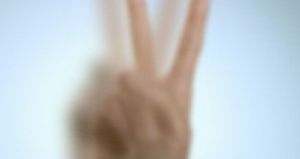
- if the rules of drug administration are not observed, the nerve can be damaged and paralysis may develop;
- during the period of action of the drug, or after it, there may appear double vision, blurred vision and blindness;
- nausea, vomiting;
- decrease in pressure, progression of heart failure, as well as increased pressure;
- may appear local reactions in the form of edema of the tissues, itching, rhinitis, difficulty in swallowing, as well as hives and difficulty breathing.
According to patients
Reviews of patients who were anesthetized by injection of Artifrin.
I was removed a tooth for six months. The dentist used Artifrin. Numbness felt almost immediately after the injection. Everything went perfectly, no side effects of the medicine did not cause.
Oleg, 28 years old
My 10-year-old son was given a simple operation on the jaw using Artifrin. The child initially complained of dizziness and was very nervous. But after the anesthesia passed, all the symptoms disappeared. I did not notice any tumors on the gum.
Olga, 35 years old
I suffer from hypertension. Recently did a little procedure at the dentist. The doctor introduced me Artifrin. The sensors showed a slight increase in the pulse, but I myself felt quite satisfactory throughout the entire period of the anesthesia. Now I advise everyone this sign to retired people this solution.
Igor, 62 years
Cost and analogues of
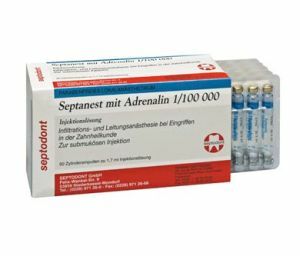 To budgetary analogues of this drug solution can be attributed Alfakain SP, Artikain, Brilokain, Ubistizin, Primakain, Septanest.
To budgetary analogues of this drug solution can be attributed Alfakain SP, Artikain, Brilokain, Ubistizin, Primakain, Septanest.
Price Artifrin fluctuates around 1000 rubles for 50 ampoules.
The drug should be stored at a temperature of no higher than 25 degrees in a dark place.
Do not freeze and further defrost the drug solution. Shelf life is 24 months.
